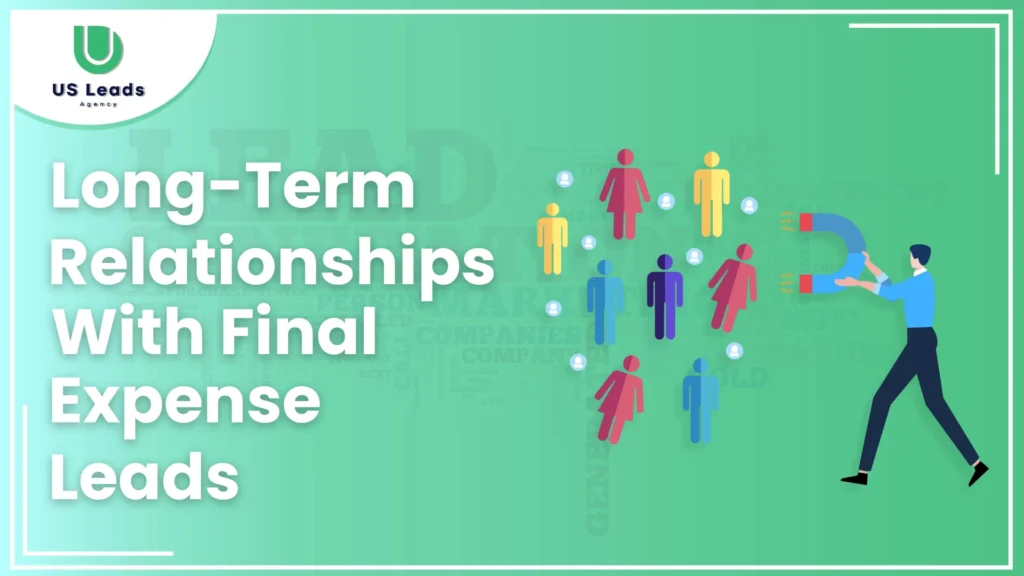
Building meaningful, long-term relationships with final expense leads is more than selling policies, it’s about creating trust, delivering value, and becoming a reliable partner in their financial journey. This client-first approach enhances retention, drives referrals, and positions your business as a trusted resource in end-of-life planning.
In this guide, you’ll discover actionable strategies to build long-term relationships with final expense leads, maintain engagement, and foster loyalty with final expense leads.
Key Takeaways:
- Understanding clients needs to create personalized solutions.
- Use consistent, multi-channel communication to stay connected.
- Leverage technology and social proof to build credibility.
- Offer exceptional service and proactive post-sale support.
- Create a sense of community for long-term engagement.
Table of Contents
What Are Final Expense Leads?
Final Expense Leads refer to potential clients interested in final expense insurance policies designed to cover funeral costs, burial expenses, and other end-of-life financial needs. These leads are typically generated through various marketing efforts targeting seniors and retirees.
Why Are Final Expense Leads Important?
- Efficiency: Focus on qualified prospects, saving time and resources.
- Higher Conversion Rates: Leads are more likely to convert into policyholders.
- Revenue Growth: Final expense policies are profitable and cater to a growing demographic.
Strategies To Build Long-Term Relationships With Final Expense Leads:
1. Understand Your Leads’ Needs:
Trust begins with empathy and understanding. Take the time to:
- Actively listen to clients’ concerns and preferences.
- Address financial and emotional needs.
- Offer tailored solutions that align with their priorities.
This approach positions you as a trusted advisor, not just a salesperson.
2. Communicate Effectively and Consistently:
Maintaining consistent communication keeps you top of mind and strengthens relationships.
Tips:
- Follow-Up Calls: Check in regularly to show genuine care.
- Email Newsletters: Share helpful tips, updates, and reminders.
- Personalized Messages: Send birthday or holiday greetings to add a personal touch.
3. Educate and Empower Your Clients:
An informed client is more likely to stay loyal. Provide educational resources on:
- Final expense insurance coverage options.
- Steps for making informed policy decisions.
- The claims process and post-sale support.
Empowered clients often become advocates for your services.
4. Provide Exceptional Customer Service:
Outstanding service fosters long-term trust and satisfaction.
Best Practices:
- Respond promptly to inquiries.
- Be transparent about policy details and costs.
- Offer support during claims or policy updates.
5. Leverage Technology for Relationship Building:
Use technology to streamline communication and enhance personalization.
Tools:
- CRM Systems: Track interactions and manage client relationships.
- Automation: Schedule follow-ups and reminders.
- Social Media: Engage clients on their preferred platforms.
6. Build a Community Around Your Brand:
Creating a sense of belonging encourages loyalty and advocacy.
Ideas:
- Host webinars on financial literacy and planning.
- Share testimonials and client success stories.
- Offer referral incentives to reward loyal clients.
7. Demonstrate Empathy and Authenticity:
Approach every interaction with care and honesty.
Key Tips:
- Show genuine empathy for clients’ concerns.
- Avoid high-pressure sales tactics.
- Focus on building trust rather than closing sales.
8. Offer Post-Sale Support:
Strong relationships don’t end after the sale.
Post-Sale Strategies:
- Check in to ensure client satisfaction.
- Assist with policy updates and beneficiary changes.
- Support families during the claims process.
9. Develop a Long-Term Engagement Strategy:
Consistent engagement keeps relationships strong over time.
Strategies:
- Send newsletters with valuable content.
- Host educational events for your clients.
- Collect feedback to continuously improve your services.
10. Build Trust Through Social Proof:
Sharing positive client experiences enhances your credibility.
Examples:
- Highlight testimonials on your website and social media.
- Showcase success stories where your policies made a difference.
- Encourage clients to leave reviews online.
Conclusion – Build Long-Term Relationships With Final Expense Leads:
Building long-term relationships with final expense leads requires prioritizing people over policies. By understanding client needs, maintaining consistent communication, and providing exceptional service, you foster trust and loyalty.
Embrace technology, foster a sense of community, and always approach interactions with empathy and authenticity. These efforts will not only drive business growth but also position your brand as a trusted partner in end-of-life planning.
FAQs:
Why is understanding clients’ needs essential for building relationships?
Tailored solutions foster trust and position you as a reliable advisor.
What are the best ways to stay connected with clients?
Use follow-up calls, personalized messages, and email newsletters to maintain consistent communication.
How can I use technology to nurture client relationships?
CRM tools, automation, and social media streamline communication and enhance personalization.
How does post-sale support impact client retention?
Proactive support improves satisfaction, strengthens trust, and increases referrals.
